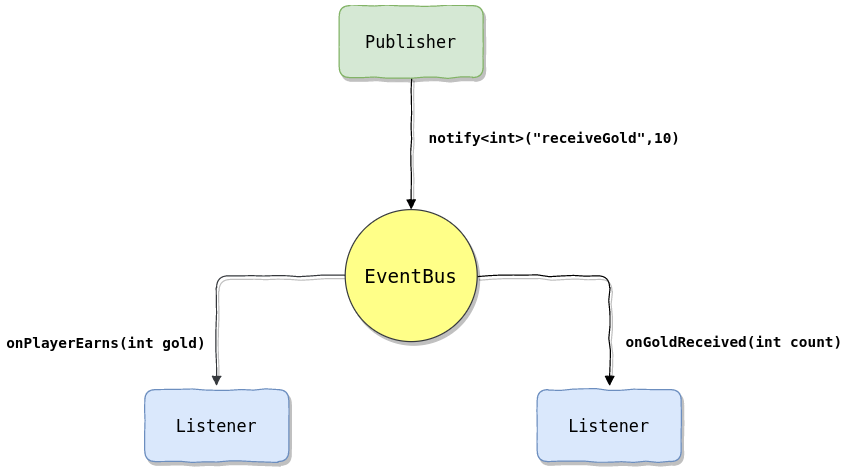4.1 KiB
EventBus
Simple and very fast event bus. The EventBus library is a convenient realization of the observer pattern. It works perfectly to supplement the implementation of MVC logic (model-view-controller) in event-driven UIs
EventBus was created because I want something easy to use and faster than CCNotificationCenter from cocos2d-x library. Of course C++11 support was mandatory.
EventBus is:
- Fast
- Easy to use
- Strong typed
- Free
- Decouples notification senders and receivers
Usage
Notify by Event object
Dexode::EventBus bus;
Dexode::Event<int> simpleEvent{"simple"};
//...
bus.notify(simpleEvent, 2);//Everyone who listens will receive this notification.
Notify without Event object
Dexode::EventBus bus;
//...
bus.notify<int>("simple", 2);//Everyone who listens will receive this notification.
Lambda listener
Dexode::EventBus bus;
//...
int token = bus.listen<int>("simple", [](int value) // register listener
{
});
//If we want unlisten exact listener we can use token for it
bus.unlistenAll(token);
Listener is identified by token. Token is returned from EventBus::listen methods.
We can register multiple listeners on one token.
Dexode::EventBus bus;
Dexode::Event<int> event{"simple"};
//...
int token = bus.listen(event, [](int value) // register listener
{
});
bus.listen(token, event, [](int value) // another listener
{
});
bus.unlistenAll(token);//Now those two lambdas will be removed from listeners
If you don't want handle manually with token you can use EventCollector class.
It is useful when we want have multiple listen in one class. So above example could look like this:
Dexode::EventBus bus;
Dexode::Event<int> event{"simple"};
Dexode::EventCollector collector{&bus};
//...
collector.listen(event, [](int value) // register listener
{
});
collector.listen(event, [](int value) // another listener
{
});
collector.unlistenAll();//Now those two lambdas will be removed from listeners
class Example
{
public:
Example(Dexode::EventBus& bus)
: _collector{&bus}
{
_collector.listen<int>("event1", std::bind(&Example::onEvent1, this, std::placeholders::_1));
_collector.listen<std::string>("event2", std::bind(&Example::onEvent2, this, std::placeholders::_1));
}
void onEvent1(int value)
{
}
void onEvent2(std::string value)
{
}
private:
Dexode::EventCollector _collector;// use RAII
};
//EventCollector sample
Dexode::EventBus bus;
Example ex{bus};
//...
bus.notify<int>("event1", 2);
Add to your project
EventBus can be added as ADD_SUBDIRECTORY to your cmake file.
Then simply link it via TARGET_LINK_LIBRARIES
Example:
ADD_SUBDIRECTORY(lib/EventBus)
ADD_EXECUTABLE(MyExecutable
main.cpp
)
SET_TARGET_PROPERTIES(MyExecutable PROPERTIES
CXX_STANDARD 14
CXX_STANDARD_REQUIRED YES
)
TARGET_LINK_LIBRARIES(MyExecutable PUBLIC Dexode::EventBus)
Also if you want you can install library and add it any other way you want.
Performance
I have prepared some performance results. You can read about them here
Small example:
check10NotificationsFor1kListeners 273 ns 273 ns 2609987 sum=-1.81219G
check10NotificationsFor1kListeners_EventBus2 267 ns 267 ns 2652159 sum=-1.77676G
check10NotificationsFor1kListeners_CCNotificationCenter 11172 ns 11171 ns 62865 sum=54.023M
Thanks to
- stanislawkabacinski for fixing windows ;) 53d5026
- kuhar for his advice and suggestions for EventBus
- ruslo for this great example: https://github.com/forexample/package-example
License
EventBus source code can be used according to the Apache License, Version 2.0.
For more information see LICENSE file
